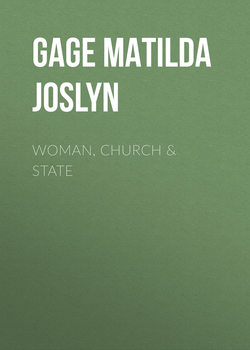Woman, Church & State

Реклама. ООО «ЛитРес», ИНН: 7719571260.
Оглавление
Gage Matilda Joslyn. Woman, Church & State
Preface
Chapter One. The Matriarchate
Chapter Two. Celibacy
Chapter Three. Canon Law
Chapter Four. Marquette
Chapter Five. Witchcraft
Chapter Six. Wives
Chapter Seven. Polygamy
Chapter Eight. Woman and Work
Chapter Nine. The Church of Today
Chapter Ten. Past, Present, Future
Отрывок из книги
Christianity tended somewhat from its foundation to restrict the liberty woman enjoyed under the old civilizations. Knowing that the position of every human being keeps pace with the religion and civilization of his country, and that in many ancient nations woman possessed a much greater degree of respect and power than she has at the present age, this subject will be presented from a historical standpoint. If in so doing it helps to show man’s unwarranted usurpation over woman’s religious and civil rights, and the very great difference between true religion and theology, this book will not have been written in vain, as it will prove that the most grievous wrong ever inflicted upon woman has been in the Christian teaching that she was not created equal with man, and the consequent denial of her rightful place in Church and State.
The last half century has shown great advance in historical knowledge; libraries and manuscripts long inaccessible have been opened to scholars, and the spirit of investigation has made known many secrets of the past, brought many hidden things to light. Buried cities have been explored and forced to reveal their secrets; lost modes of writing have been deciphered, and olden myths placed upon historic foundations. India is opening her stores of ancient literature; Egypt, so wise and so famous, of which it was anciently said: “If it does not find a man mad it leaves him mad,” has revealed her secrets; hieroglyph-inscribed temples, obelisks and tombs have been interpreted; papyri buried 4,000 and more years in the folds of bandage-enveloped mummies have given their secrets to the world. The brick libraries of Assyria have been unearthed, and the lost civilization of Babylonia and Chaldea imparted to mankind. The strange Zunis have found an interpreter; the ancient Aztec language its Champollion, and the mysteries of even our western continent are becoming unveiled. Darkest Africa has opened to the light; the colossal images of Easter Island hint at their origin; while the new science of philology unfolds to us the history of peoples so completely lost that no other monument of their past remains. We are now informed as to the condition of early peoples, their laws, customs, habits, religion, comprising order and rank in the state, the rules of descent, name, property, the circumstances of family life, the position of mother, father, children, their temples and priestly orders; all these have been investigated and a new historic basis has been discovered. Never has research been so thorough or long-lost knowledge so fully given to the world.
.....
The order of Vestal Virgins flourished eleven hundred years, having been founded seven hundred years before the Christian era and continuing four hundred years afterwards. But those women all young, all between the ages of six years and forty, so closely guarded the secrets of the Penetralia that to this day they still remain as unknown as when in their charge. The order was destroyed in the fourth century, but the ruins of their temple recently discovered prove that when obliged to flee from the sacred enclosure they first demolished the most holy portion where the secrets of Rome were hidden.38 Recent important archaeological discoveries at the Atrium Vertae in the Forum, corroborate history in regard to the high position and extraordinary privileges of the Vestals. Several statues have been found representing the sacred maiden with the historic fillet about her head and the cord beneath her breast. Medallions worn upon the breast of their horses have also been unearthed. The wealth of the order was extremely great, both its public and private property being exempt from that conscription which in times of war reached all but a few favored individuals.
The names by which Imperial Rome was known were all feminine; Roma, Flora, Valentia; nearly its first and greatest goddess was Vesta.39
.....